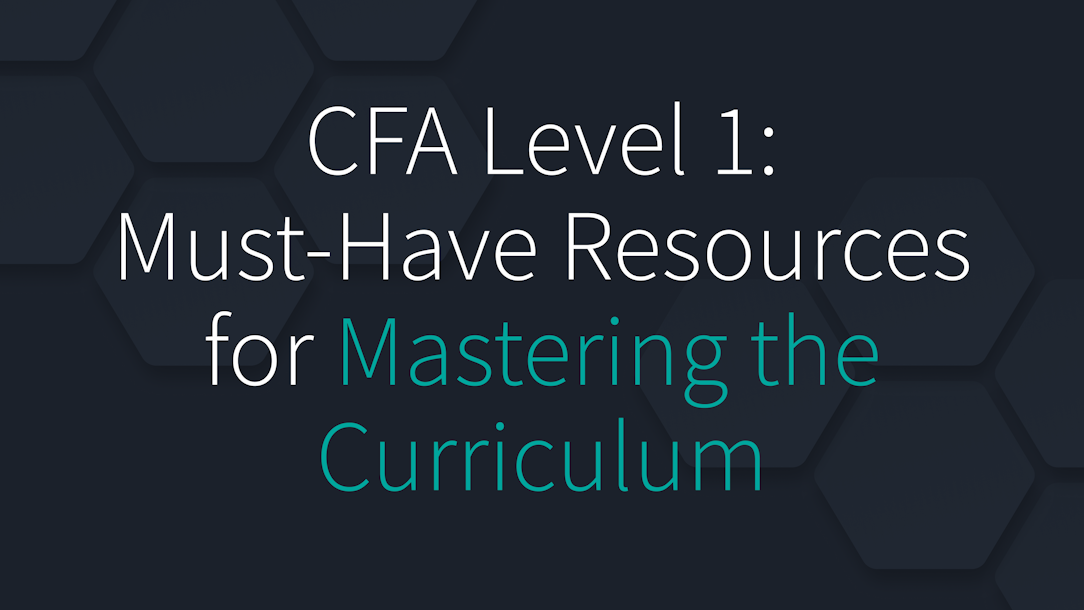
CFA Level 1: Must-Have Resources for Mastering the Curriculum
CFA Level 1 success depends on using a combination of resources that align with your study habits and learning style. Study guides, question banks, mock exams, and interactive tools can ensure a comprehensive and efficient preparation strategy.
The CFA Level 1 exam is a rigorous test of fundamental financial knowledge, requiring a deep understanding of core investment concepts, ethics, and analytical techniques. With an extensive curriculum and a vast amount of material to cover, having the right study resources can make all the difference in mastering the exam.
To help you build an effective study plan, we’ve compiled the must-have resources that will enhance your comprehension, retention, and exam-day readiness.
1. Official CFA Institute Materials: The Core Resource
The CFA Institute’s official curriculum serves as the foundation for Level 1 preparation. It provides:
- Comprehensive topic explanations aligned with exam objectives.
- End-of-chapter questions for self-assessment.
- Detailed examples that illustrate real-world applications.
While the curriculum is extensive, it is not always the most efficient way to study. Many candidates supplement it with condensed materials to reinforce key concepts without excessive reading.
2. Third-Party Study Guides: Condensed Learning for Efficiency
Third-party providers offer streamlined study guides that summarize key topics without unnecessary detail. These guides:
- Break down complex topics into digestible sections.
- Provide concise explanations to reinforce learning.
- Offer quick review notes for last-minute revision.
While these guides are helpful for efficiency, candidates should cross-check concepts with official materials to ensure full curriculum coverage.
3. Question Banks: Reinforcing Knowledge Through Practice
A strong Q-bank is one of the most potent tools for CFA preparation. Effective question banks:
- Offer thousands of practice questions covering all topic areas.
- Provide detailed explanations for correct and incorrect answers.
- Utilize adaptive learning to adjust question difficulty according to individual performance.
Regularly practising exam-style questions improves comprehension and builds exam-day confidence.
4. CFA Level 1 Mock Exam: The Ultimate Readiness Test
Mock exams simulate real exam conditions, helping candidates develop:
- Time management skills for completing questions within exam constraints.
- Endurance to sustain focus over long testing periods.
- Performance insights to identify strengths and weaknesses.
Candidates should aim to complete at least 3-5 full-length mock exams before test day, analyzing mistakes to refine their approach.
5. Video Lectures and Interactive Learning Tools
For visual and auditory learners, video lectures and interactive tools can enhance retention. These resources:
- Break down complex concepts with real-world examples.
- Offer on-demand lessons that fit busy schedules.
- Enhance concept recall with interactive quizzes and engaging animations.
Pairing video content with active note-taking and problem-solving enhances comprehension and long-term retention.
6. Study Groups and Online Forums: Learning Through Discussion
Engaging in CFA study groups and forums can:
- Provide peer support and motivation.
- Help clarify challenging topics through discussion.
- Offer insights from successful candidates who have passed the exam.
Platforms like AnalystForum and LinkedIn groups allow candidates to exchange study strategies and exam tips with peers worldwide.
7. CFA Level 1 Formula Sheets and Cheat Sheets
A well-organized formula sheet is essential for quick recall during practice. These sheets:
- List high-priority formulas in an easy-to-review format.
- Highlight critical concepts needed for quantitative topics.
- Serve as a rapid reference tool during revision sessions.
Candidates should create custom formula sheets to reinforce learning through active engagement.
8. Mobile Apps and CFA Study Tools for On-the-Go Learning
For candidates balancing work and study, mobile apps offer:
- Flashcards for memorizing key concepts and formulas.
- Quiz-based learning for reinforcing weak areas.
- Audio summaries for convenient revision while commuting.
Integrating mobile learning into a daily routine maximizes study efficiency without requiring long, uninterrupted sessions.
9. Time Management and Study Planning Tools
A structured study plan ensures that candidates:
- Cover all CFA Level 1 topics without cramming.
- Allocate time effectively based on topic weightings.
- Track progress and adjust schedules based on mock exam results.
Tools like Trello, Notion, and Google Calendar help organize study sessions and maintain discipline.
10. The Role of Tutoring and CFA Prep Courses
For candidates needing extra guidance, CFA prep courses and tutoring can:
- Provide personalized study plans tailored to each individual's specific weaknesses.
- Offer direct access to CFA experts for complex topic explanations.
- Help improve exam strategy and confidence before test day.
Candidates should assess their learning style to determine whether self-study or guided instruction is the most effective approach.
Conclusion
CFA Level 1 success depends on using a combination of resources that align with your study habits and learning style. While the official curriculum forms the foundation, supplementing it with study guides, question banks, mock exams, and interactive tools ensures a comprehensive and efficient preparation strategy.
At Salt Solutions, we provide CFA Institute-validated study materials designed to help candidates excel. Whether you're preparing for CFA Level 1, moving forward with CFA Level 2, or tackling the final hurdle of CFA Level 3, our resources are built for success-driven candidates.
Mastering the CFA Level 1 curriculum is about strategy, consistency, and intelligent study choices—let Salt Solutions guide you every step of the way!